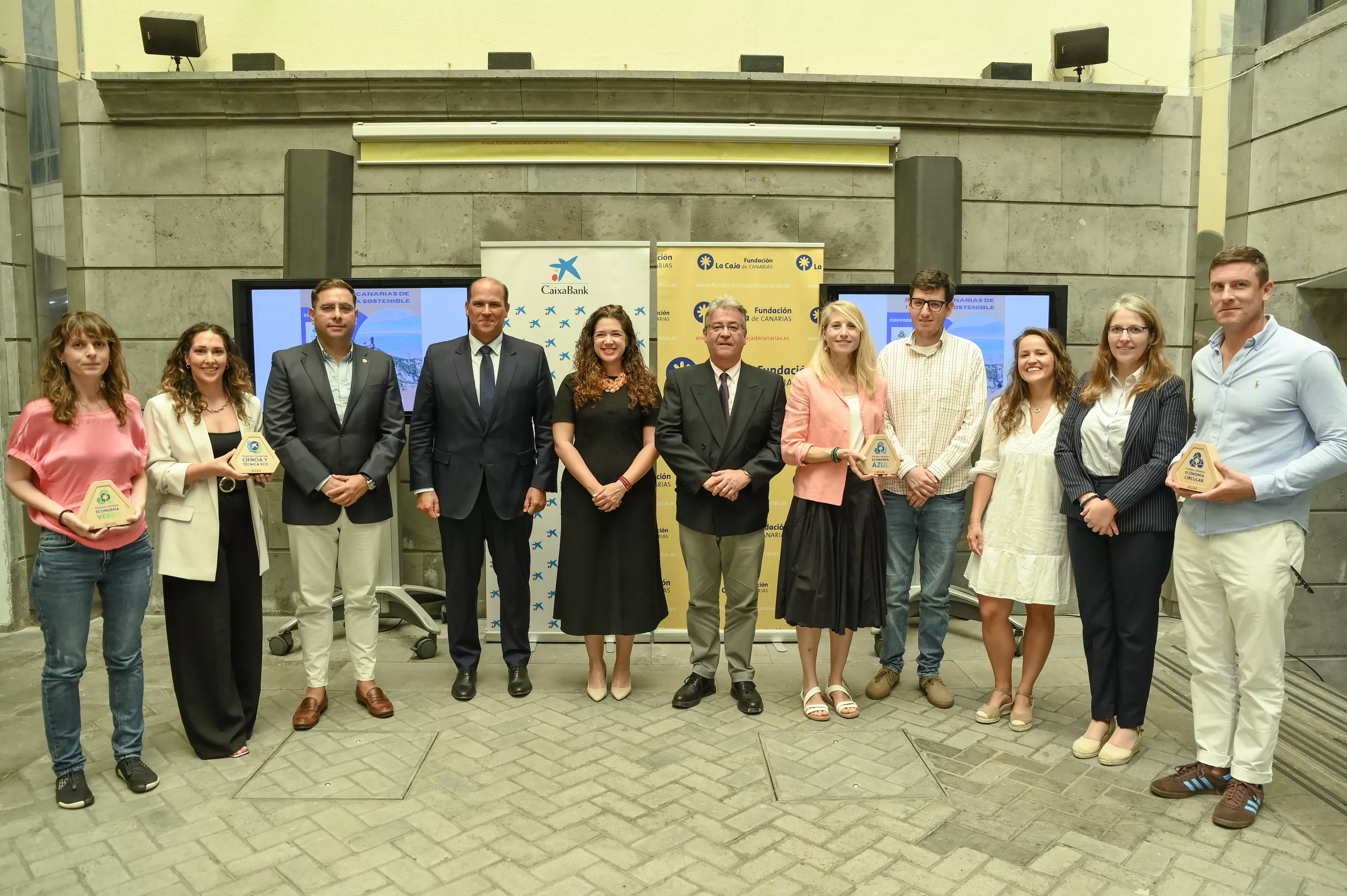
CaixaBank and the Fundación La Caja de Canarias presented the ‘Canary Islands Sustainable Economy Awards’ on Monday, 7th July, in its fourth edition.
This initiative recognises those projects that have excelled during 2024 for their contributions to tackling climate change, defending biodiversity, or implementing a circular economy in the Canary Islands.
The awards celebrated the business projects from Energía Bonita Sociedad Cooperativa, MacroCarbón, Impressora and the Plataforma SICMA-Canarias.
The award ceremony took place at the Cultural Initiatives Centre of the Fundación La Caja de Canarias (CICCA) and featured the participation of the General Director of the Fundación La Caja de Canarias, Fernando Fernández; the Territorial Director of CaixaBank in the Canary Islands, Manuel Afonso; and the General Director of Regulation, Innovation and University Quality of the Government of the Canary Islands, Jassary Alvarado.
During the awards ceremony, the General Director of the Fundación La Caja de Canarias emphasised that “in a particularly delicate environment, such as the Canary Islands, both due to its ecosystem and its insularity, as well as the remoteness of supply and destination centres for our products, it is more essential than ever to consider sustainable growth. And these awards, along with the awarded projects, are making that possible, little by little”.
Fernández also highlighted the significance of public-private collaboration in changing how things are done.
From CaixaBank’s perspective, the Territorial Director of the entity in the Canary Islands pointed out both the level and volume of applications submitted, noting this edition had 43 projects, double that of the previous edition.
Manuel Afonso stated, “we aim to reward and recognise businesses and entrepreneurs who, in addition to generating value and contributing wealth to the Islands, do so sustainably from their beginnings. We have an increasing number of candidates and a higher calibre, which speaks to the progress and weight of the sustainable economy and its contribution to job creation.”
Moreover, Afonso indicated that the concern and commitment from Canary Island entrepreneurs are growing, and together we are achieving a greener economy.
Jassary Alvarado, the General Director of Regulation, Innovation and University Quality of the Government of the Canary Islands, argued that “these companies, committed to the environment and sustainable economy, are carrying out a silent but solid transformation of our land’s economy.
We aim to promote this type of initiative because we understand it is vital in the current moment. Sustainability is necessary,” Alvarado affirmed.
The award in the Green Economy category went to Energía Bonita, an energy community from the island of La Palma.
This non-profit cooperative is comprised of individuals, small and medium-sized enterprises, and local administrations, aiming to produce and share renewable energy while building an energy model based on savings and efficiency.
Currently, they have over 50 members, and among their main commitments is the fight against energy poverty, integrating all individuals regardless of their socio-economic situation.
The award in the Blue Economy category went to MacroCarbón, a startup linked to the Scientific and Technological Park of the University of Las Palmas de Gran Canaria.
Led by Mar Fernández Méndez and Jason Cole, this company focuses on cultivating seaweed to produce biofuels that can replace fossil fuels.
Their goal is to generate sustainable, renewable raw materials with negative carbon emissions, thus contributing to reducing the carbon footprint in chemical production and the growth of the global bio-economy.
After harvesting, the carbon-rich biomass is transformed into raw materials for the chemical industry, which can replace fossil fuel-derived products.
In the Circular Economy category, the award was granted to Impressora, a group of Canary Islands companies based in Tenerife, dedicated to 3D printing and capable of constructing sustainable homes and marine structures with minimal environmental impact.
They manufacture state-of-the-art printers and are continually developing to adapt to the necessary improvements demanded by the 3D construction sector.
Furthermore, they produce sustainable building materials by utilising local natural resources such as volcanic ash.
In the Science and Technical ECO category, the Climate and Meteorological Information System SICMA-Canarias received recognition.
This open-access platform from the University of La Laguna allows users to consult current, past, and future climate conditions of the Canary archipelago, with a spatial resolution of 100 metres by 100 metres.
This level of detail makes it a strategic tool for present and future planning and management of essential resources such as water, agriculture, and Canary Islands’ natural spaces, aligning with the need to promote adaptation to climate change.
In this fourth edition of the awards driven by CaixaBank and the Fundación La Caja de Canarias, the jury was composed of Javier Franco Hormiga, Director of the ACIISI, representing the Department of Universities, Science and Innovation and Culture of the Government of the Canary Islands;
Luis Mazorra, Director of Sustainability of the University of Las Palmas de Gran Canaria; Manuel González de la Rosa, advisor to the Rector in Strategic Planning of the University of La Laguna;
Jean Carlos Martín, Innovation Technician from CEOE-Tenerife; Pedro Ortega, President of the Canary Confederation of Entrepreneurs; Iñaki Muñoz, Head of Sustainability of Business Banking of CaixaBank in the Canary Islands; and Fernando Fernández, General Director of the Fundación La Caja de Canarias.













